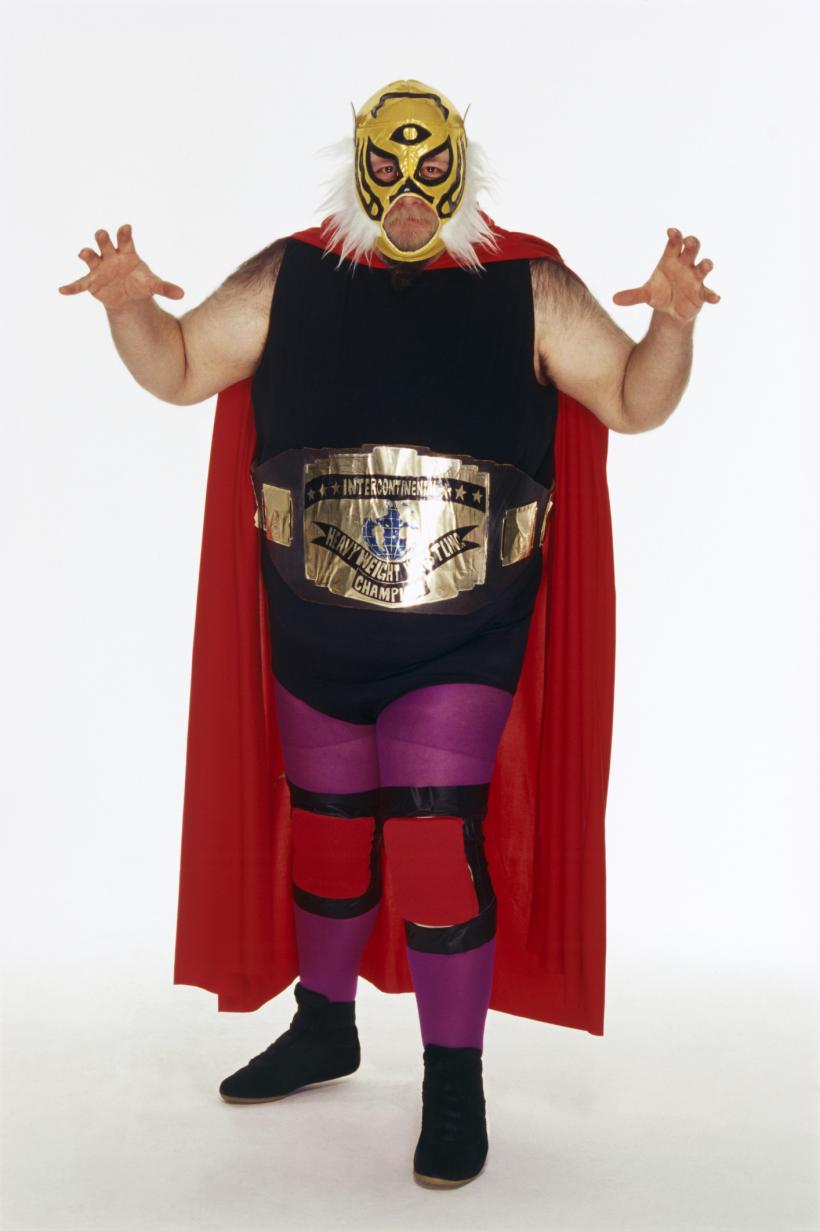
Let me lay down some learnin’ for all you pencil-neck geeks.
You think wrestling is some simian recreation for simpletons? Well: come say that to my face! Wrestling is important. It might be the single strongest cultivation of American pop culture. Pro wrestling has influenced our music, our films—it’s a complex performance art bred of combat athleticism and improvisational acting, whose esoteric inner language and politics belie its immense reach and accessibility.
It tells stories that—though masquerade in macho muscle mystery—are close to the heart of American identity. Help your fucking self to some heartbreak: for every two or three “I can beat this guy up” throwaways there is to be found a hot host of futile swan songs of once young superstars succumbing to the ravages of age and reckless courage in the face of the battle you know you'll never win.
Wrestling is a dirty wrought mirror of the American psyche—it illuminates our fears of foreign invaders and sissified men polluting the pool of hyper masculinity. In showing us what we consider to be the “best” (physical and moral) shape of men, wrestling can also show us the worst of ourselves, a swarming hive of thoughtless apes hurling slurs from the safety of our audience seating.
Like many “male-minded” forms of entertainment, wrestling ruthlessly riles up disdain for “political correctness” for being a decent person for decency’s sake. And while it may be only inadvertently, wrestling has informed much of my understanding of social justice in its blatant attempts to pretend it can’t understand our criticism.
You can learn a lot from wrestling—or at the very least, you can learn what I’ve learned from wrestling by reading this list.
You scumbag.
Get in the ring with me and make your mama weep.
-
On Accessibility
In wrestling, we have what’s called a “promo.” A promo is any time a wrestler speaks outside the context of a wrestling match. It can take the form of a pre-match interview, or a backstage skit with other performers. These moments establish and explore the character free from the confines of being sweaty and covered in some other sweaty guy’s blood. They can also “promote” their upcoming matches with other wrestlers, encouraging viewer investment through the establishment of an emotional stake.
In laymens terms: I hate this guy so much I’m going to kick his ass. Come see me kick his ass.
One of the greatest promos of all times is Dusty Rhodes’ “Hard Times” segment, performed in 1985.
So, Dusty Rhodes is quite cross with Ric Flair. Ric Flair is not only, as the “dirtiest player in the game” and leader of The Four Horsemen, a cheating fuck, but also complicit in a classist system that feeds the working classes just enough not to starve in order to bide time for the total automation of labor.
This isn’t extrapolation. That’s what he just fucking said!
Through framing his frustrations at society at large (through an admittedly simple and almost child-like “you suck, I’m gonna kick your ass”) Dusty Rhodes reaches out to his audience, the other working class people like him, and says to them “I see you, I see what’s going on, and I have your back”—more importantly, in a language they understand.
Dusty got the people in his corner. This ensures an emotional investment from the audience in his upcoming performance—an investment that manifests in people watching him wrestle, which sells tickets to the venue and ensures sponsors that their money is well spent. Unlike all of Ric Flair’s money, which couldn’t save him from an All-American ass-whooping by the son of a plumber.
The very people that we, as activists, struggle to reach with our clinical language and super charged compassion, go bugnuts for those kinds of stories. Not for a deficiency of discerning reasoning, but because it’s a language they speak.
Having the right information and the right politics is intrinsically worthless. I know and can prove with charts and figures that colonialism influences the prevalence of rape and sexual assault among women of particular cultural backgrounds. But I cannot cook it or use it to stop a bullet.
All that knowledge is good for, all it can ever be good for, is to help me educate and support and share space with other people. Together, we, informed by our collective, compassionate understanding, can affect change, through protests and potlucks and sustainable systems of support and resistance.
It doesn’t matter if you’re right. It really doesn’t. A single working mother of three’s life is not improved in any comparable way by you knowing the differences between leninism and trotskyism.
But a fluency in the historic and oft-overlooked role of women in the labor movement, informed by your experiences with sexism and misogyny in the workplace, might, if you are very lucky, prove you are not an overeducated fuckface and that you are worth trusting and listening to.
And that intimacy with another person is worth more than all the book learning in all the libraries. Well, at least the humanities and politics sections.
We still need medicine and some agriculture.
Our language was only ever meant to be tools to connect with other people. To assign value over having the “right” language and phrasing it in the “right” venues is to weaponize it, making one of the master’s tools.
(After all: Dusty Rhodes, with all his power and street smarts, still needed us to believe in him to defeat Ric Flair . . . to sustain a shared narrative of the title belt’s worth within the context both wrestler’s established in-universe toughness and moxie to create “stakes” for their scripted confrontation).






